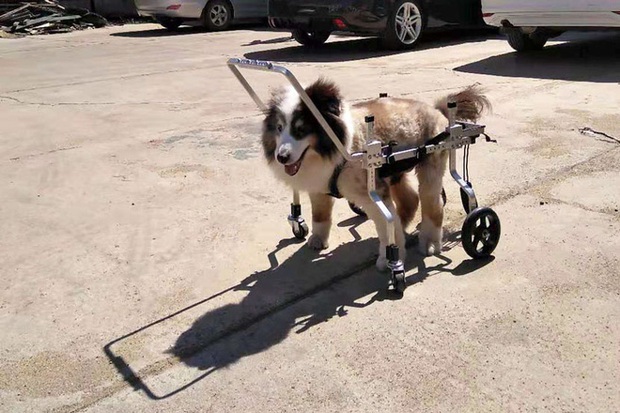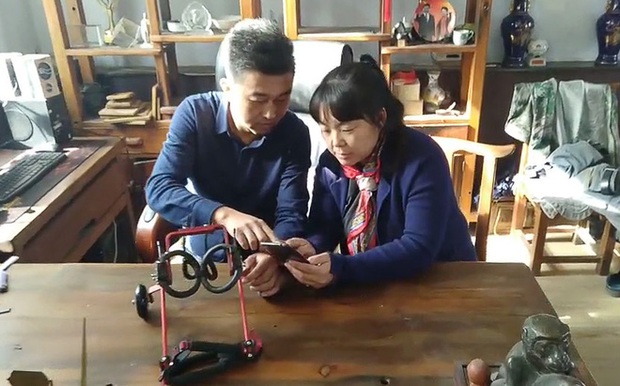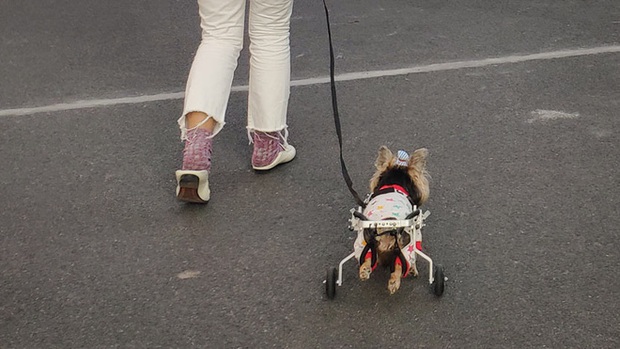A former factory worker from Liaoning Province, China, quickly entered the pet toy market, which specializes in providing moving equipment for sick and wealthy pets.
Wei Lijun became distraught after her 19-year-old dog Fufu suffered a stroke earlier this year. The animal is then almost completely paralyzed and often cries in pain every night. Wei even had to take her pet to live in a quiet area to avoid disturbing the neighbors.
The 56-year-old fears Fufu will never walk again, but she refuses to give up on her beloved animal. Finally, a vet came up with a solution: why not order a wheelchair for Fufu?
Wei searched online and found a company that specializes in providing personalized pet mobility devices, for only 630 yuan (about $ 90). A few days later, a new wheelchair appeared and brought the effect almost immediately. Within hours, Fufu got to know each other and flew through the streets near Wei’s home in Shanghai.
“It’s amazing,” Wei said. “He now seems very happy and comfortable to ‘take a walk’ outside.”
Wei is just one of thousands of pet owners in China who have used the services of Gao Xiaodong, a former migrant worker from LoLao Lake in northeastern Liaoning Province, who helped countless caves. things have a new life.
Gao Xiaodong, 44, claims to be the first in China to sell mobility aids to animals. After retiring from the factory, he opened a small workshop in 2006. From a small business it has now grown into a thriving business, thanks to the boom in pet ownership. China.
Today, nearly 100 million families in China have pets, up 44% since 2014, and the country’s pet industry is worth around 200 billion yuan (about $ 28 billion). More and more pet owners are willing to spend large sums of money to provide their pets with a more comfortable life. This is why the market for pet travel products, including mobility products and solutions, has grown by 40% over the past year.
Gao currently operates a 300 square meter factory which employs eight people, creating more than 4,000 wheelchairs per year. The company is responsible for almost all pet mobility devices sold on e-commerce platforms such as Taobao and JD.com. “The vast majority of other suppliers are agents or business partners of the company,” Gao said.
He remembers the first time he saw a dog wheelchair about 15 years ago when he was working as a door-to-door salesperson. One of his clients made a temporary frame for his paralyzed Pekingese dog. This system allows animals to walk using a skateboard and four bearings.
Two years later, Gao returned to his hometown to try his luck as an entrepreneur. After several unsuccessful attempts to sell health care and computer products, he found the websites of several foreign pet wheelchair manufacturers while researching a business idea. new route. A man with a Peking dog crossed Gao’s mind and he was sure he had found a viable project.
Gao and his wife, Fu Lijuan, created the first prototype of a disabled stray dog who often begs for food near his home. According to Gao, the first car was very simple, built from a number of woods, ropes and roller skates. “It didn’t look very good, but the dog didn’t seem to care,” Gao recalls. “He was eager to try it out and ran really fast.”
After this initial success, Gao was confident enough to quit his job at the local zinc factory to devote all of his energy to the pet wheelchair business. But his parents didn’t like the idea.
“They looked at me with astonished expressions,” Gao said. “They can’t believe I gave up a steady job at a public company to make a wheelchair for disabled animals.”
At that time, keeping pets indoors was still a luxury for most people in China. Low-income families and pets are more likely to get sick or die before they reach old age. Gao and Fu’s neighbors also frequently wonder whether the couple are crazy or not.
“None of them have heard of this business and they don’t believe that people will actually buy animal wheelchairs,” Fu Lijuan said.
During his early years, Gao also sometimes wondered if what he was doing was right. In 2008, he remembers selling only a few wheelchairs a month. However, over time the sales numbers gradually increase to tens and then to hundreds.
This is linked to a radical change in social attitudes towards animals, argues Gao. Although China has yet to pass any animal welfare laws on pets, cities have become much more animal-friendly than in the past, even with a large number of active welfare projects. objects have been deployed across the country.
“Animals often live with their owners for many years and become part of the family without knowing it,” Gao said. “And just like when people get terminally ill, everyone in the family will do anything to prolong their life.”
Wang Jinyu bought a personalized wheelchair from Gao for his Yorkshire terrier, named Gin, in 2015. His father accidentally stepped on Gin when the animal was eight months old, causing him to lose his chance. used his hind legs. The vet says Gin has only five years left to live, but Wang is determined to do whatever he can to help him.
Wang massages the Gin every day and finds a wheelchair to move the dog. The first one she bought was too big and too heavy for the Gin, which weighed only 2.5kg, but Gao’s product really worked. It has been 4 years since the accident, Gin is still able to go out at least twice a day.
“With the car, he can walk a lot faster than before,” Wang said. “And now he’s always stuck his tongue out, which shows he’s very happy.”
According to Wang, at least a dozen people have asked her if they can buy a similar wheelchair when she has taken Gin out for a walk over the years. One of her neighbors ordered a wheelchair for her breed of golden retriever so she could enjoy the outdoors. The dog died a few months later, but according to Wang, everything is worth it.
As Gao’s reputation spread, the Lo Lo Island factory received more orders than ever. The company now produces around 1,000 wheelchairs for export each month, according to Gao. He says 90% of wheelchairs are for dogs, while 9% are for cats. The remaining 1% is intended for a variety of other animals such as rabbits, turtles and pigs. The company also makes horse wheelchairs at a Chinese zoo, as well as goats at an overseas farm, he added.
Gao said he was delighted to see more and more pet owners in China ready to help their fragile or frail dogs enjoy a new life. And it seems that dogs can adapt to a wheelchair very quickly. Unfortunately, some dogs died before their mobility aids arrived.
“Our customers will continue to pay for a wheelchair,” Gao said. “They often bury him with their beloved dogs, hoping they can run free in another world.”
Gao’s next project is to start building a pet house, aimed at meeting clients’ need to take care of their pets. He believes there is still a lot of room for growth in the pet services market. The US pet food giant made a similar prediction, estimating it could double in the next five years.
Even so, Gao’s main goal is to make sure that each animal is as comfortable as possible. “We are all born equal,” Gao said. “Animals, whether they can walk or not, all deserve respect.”
Sixthtone





